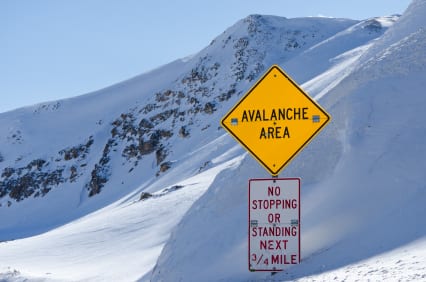 Life gets crazy sometimes. Every day the news highlights the most recent crisis du jour, spinning out stories of the latest financial, political or environmental catastrophe. It’s enough to make you crazy. Even without the gloomy stories on the news, our own lives are often enough to send us into a panic. Whether dealing with external misfortune or internal stress, we must learn to cope with disaster.
Life gets crazy sometimes. Every day the news highlights the most recent crisis du jour, spinning out stories of the latest financial, political or environmental catastrophe. It’s enough to make you crazy. Even without the gloomy stories on the news, our own lives are often enough to send us into a panic. Whether dealing with external misfortune or internal stress, we must learn to cope with disaster.
Just like anything else, if you want to excel at crisis management, you have to practice. In my position as a Ski Patroller, I’m charged with keeping the slopes safe. When it snows, I use explosives to start avalanches, so the slopes slide when I can watch them safely from above, not when an unsuspecting skier takes her first turn. I’m an EMT, rendering first aid to injured patients, often in precarious locations. This job offers plenty of practice in crisis management. More than once, I’ve transferred these skills beyond the slopes and into my personal life.
When my husband was diagnosed with a rare liver disease, I used talents garnered on the slopes and applied them to our new ordeal, learning how to get through the harrowing moments in the hospital and awaiting the liver transplant by applying these crisis management strategies. You can too by following three easy steps.
- Slow down. When crisis hits, time speeds up. Our heart rate increases and brain activity multiplies. Push aside the urge to gallop forward. Instead, slow down and take stock. Stress makes us rash, causing hasty and poorly formed decisions. Instead, don’t decide. Don’t try to solve the entire problem right away. Break it down into smaller chunks. When the doctors told us my husband’s survival depended on a liver transplant but the cancer they’d found in his bile ducts might prevent the very treatment he needed, I told myself to get through it just fifteen minutes at a time. I couldn’t look too far into the future. I’d learned this technique as an EMT, treating life-threatening conditions with precision focus. When my husband became the patient, I looked no further than fifteen minutes into the future, telling myself I had only to address the immediate threats, and then I could deal with the rest later.
- Find support. When I control avalanches, I never go out alone. I always have a partner watching over me, ready to dig me out if I get buried in avalanche debris. We each carry a transceiver and a shovel to locate each other and dig one another out in case of a burial. We also bring a radio to call for outside help and communicate with other teams that might be working nearby. When my husband lay in the hospital, I learned to cull my resources, calling on friends and family and finally admitting I needed help. Find your allies; rely on their strength to buoy you. If necessary, don’t be afraid to speak up and ask for what you need.
- Exercise your stress muscles. Stress management is like a muscle; when we don’t use it we get flabby. Start practicing before crisis hits, when the stakes are low. Teach yourself to breathe calmly when you run into traffic on the way to work or encounter other small annoyances through the day. Start small and build up your endurance. Knowingly take on less risky adventures or tasks where success is guaranteed. Once you learn to avoid hitting the panic button, up the ante. Try rock climbing, go up in a hot air balloon, strap on a pair of skis, or sign up for an improv class. You don’t have to hear the sizzle of an explosive fuse to learn to calm your nerves. Push yourself physically and mentally to try an activity that scares you. Not only will you engage in a fun adventure, you will also hone your stress management muscles, so they are toned when you need them. A little adversity now will help in the future. You can tell yourself, “I’ve been through hard times before; I can handle the next thing that comes along.”
Handling stress with grace is not a birthright. Even the most seemingly calm-under-pressure leaders had to start somewhere. Whether on a mountain ridge or at your loved one’s bedside, we cannot predict when a crisis will strike. We can, however, strengthen our resolve to get through the harder moments. Take it in small chunks, utilize the support of others and build up your tolerance to stress before the stakes are high. That way, when the scary moments do come, you’ll be poised to handle them.
Kim Kircher has logged over 600 hours of explosives control, earning not only her avalanche blaster’s card, but also a heli-blaster endorsement, allowing her to fly over the slopes in a helicopter and drop bombs from the open cockpit, while uttering the fabulously thrilling words “bombs away” into the mic. Her memoir, The Next Fifteen Minutes, is forthcoming from Behler Publications in October 2011. She blogs at www.kimkircher.com.





